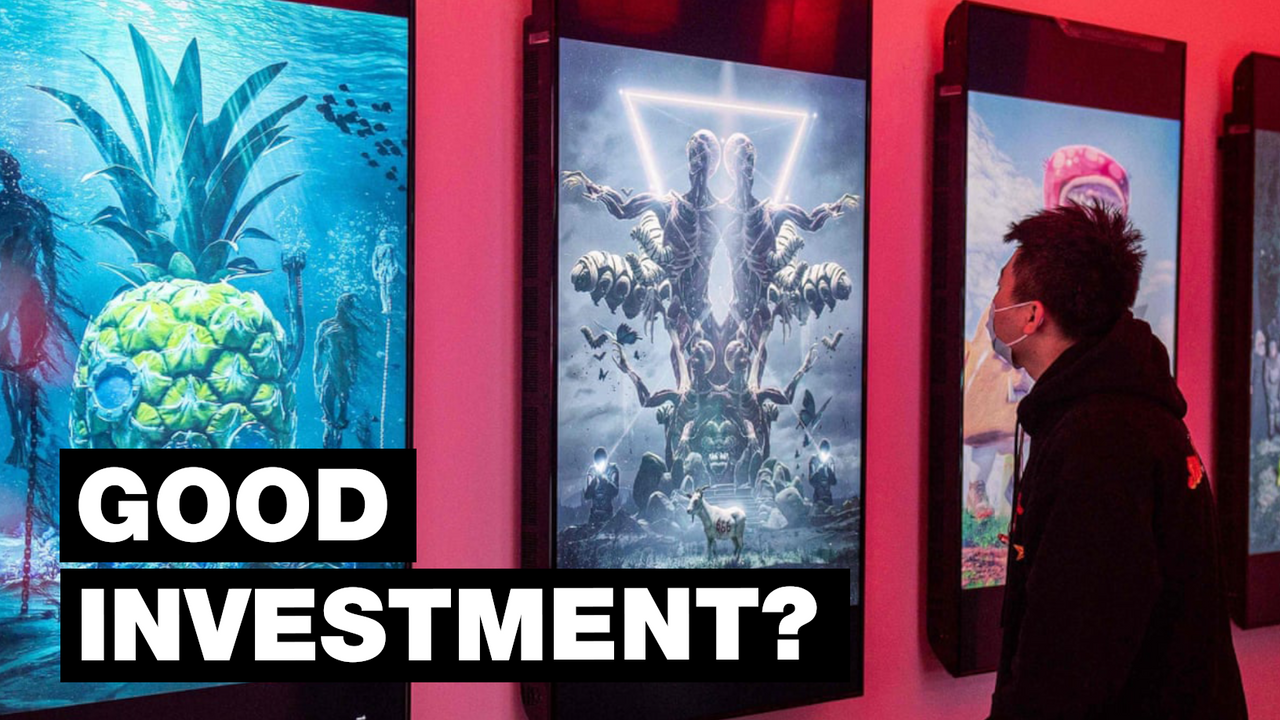
A JPEG was sold for $69 milion.
Canadian musician Grimes recently sold a bunch of NFTs for nearly $6 million.
An NFT of LeBron James making a historic dunk for the Lakers garnered more than $200,000

NFTs are being sold for astronomical amounts, but is this trend sustainable?
In this video I’ll explain what NFTs are, the problems with NFTs, and whether or not they truly are a fad. And we’re starting right now.
What Is It
NFT stands for non-fungible token.
Nonfungible, means you can't exchange it for another thing of equal value. For example, a bar of gold is fungible and can be swapped for another bar of gold of the same size. An NFT, though, is one of a kind.
The token refers to a unit of currency on a blockchain. Blockchains enable cryptocurrencies like Bitcoin to be bought and sold. In this case, most NFTs are part of the Ethereum blockchain. Ethereum is a cryptocurrency, like bitcoin or dogecoin, but its blockchain also supports NFTs, which store extra information.
NFTs can be literally anything digital such as drawings, photographs, video clips, animations, and music.
The original creator of a NFT gets a royalty every time its sold, and the person who bought it gets a part of that royalty. That process continues through a blockchain.
NFTs Are Based On An Old Concept
NFTs are a new take on an old idea where people like to keep original versions of memorabilia. This concept has been around for centuries. For example:
- Leonardo da Vinci’s Salvator Mundi sold for $450 million dollars in 2017.

- Edvard Munch’s The Scream sold for $119 million in 2012.

- Baseball cards containing portraits of Honus Wagner routinely sell for over $1 million.

The Problem With NFTs
But, there are undeniable problems with NFTs in comparison to this traditional concept:
- Whoever can acquire physical memorabilia can actually appreciate it as a physical object. But, with digital art, a copy is literally as good as the original. Taking your phone out to show someone the original digital art is almost the same as showing them a copy of that original digital art
- The NFTs of today being sold at astronomical prices and they may not have long-term value in comparison to traditional art painted by world-renown artists or physical baseball cards. Most NFTs seem to lack the novelty, scarcity, and other factors that will enable to maintain value for the next 20, 50, or 100 years. For example, it’s not likely that people 500 years from now will care about a video of Logan Paul unboxing a Pokemon card and they’re not going to care about an x-ray of William Shatner’s teeth.
- There’s the risk of that, in at lest some cases, the purchasing of over-valued NFTs are a tactic to avoid taxes and launder money. Money laundering is the process of concealing the origins of money obtained illegally by passing it through a complex sequence of banking transfers or commercial transactions. Money-laundering has been prevalent in the art world for decades.
- The computing power required to operate the blockchain systems of NFTs is enormous. According to Time magazine, Ethereum mining consumes about 26.5 terawatt-hours of electricity a year, nearly as much electricity consumed by the entire country of Ireland and its almost 5 million residents in a year. It’s mind-boggling to think much humanity would benefit if that energy was put to other uses.
Are NFTs Here To Stay?
More than likely, NFTs are here to stay because rare digital collectibles will always be in demand, just like their physical counterparts. However, the extreme prices at which NFTs are being sold will probably normalize to levels more comparable with physical memorabilia.
But, the future is impossible to predict because the value of any NFT is subjective.
FREE EBOOK - 5 FREE CHATGPT PROMPTS THAT WILL MAKE YOU A SUPERHUMAN
These 5 free ChatGPT prompts will help you reach your goals, make better decisions, solve your problems, and more.
We hate SPAM. We will never sell your information, for any reason.





